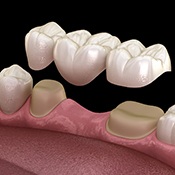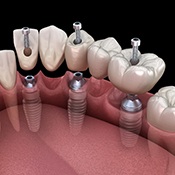Dental Bridges – Los Angeles, CA
Customized Replacement Teeth for a Beautiful Smile
Tooth loss can occur for a wide variety of reasons, ranging from poor dental hygiene and developing issues like tooth infections to undergoing certain types of medical treatments that put you at a greater risk of losing teeth. Our experienced team of dentists at Rancho Park Dental Group are expertly trained in restoring and enhancing the natural beauty of smiles, allowing us to help you rebuild your grin’s lifelike appearance and functionality. For questions or to schedule a consultation to learn more about dental bridges in Los Angeles, contact our office today!
Why Choose Rancho Park Dental Group for Dental Bridges?
- Expertly Trained Aesthetic Dentists for Beautiful Results
- We Accept & Maximize Dental Insurance Benefits
- Partnered with Experienced Dental Implant Specialists
What is a Dental Bridge?

Dental bridges are restorations that are comprised of two main parts: dental crowns, which anchor the replacement teeth in place by being cemented to the existing teeth, and pontics, which are free-standing replacement teeth fused to either side of the crowns. Together, these components can literally act to bridge the gap in your smile, restoring your entire arch of teeth.
Types of Dental Bridges

Whether you opt for a traditional or implant bridge, our team uses high-quality dental materials that are able to mimic the natural appearance of teeth, providing you with premium aesthetic results. Each of our bridges is custom designed to mimic natural teeth in every way possible. Based on your smile goals, timeline, and budget, our team will help you decide whether a traditional or implant bridge is right for you.
Traditional Bridge

Traditional bridges are designed to attach to the two natural teeth on either side of the gap in your smile to remain securely in place. This process is typically the most cost-effective and allows patients to rebuild their smile, but it does require the preparation of your natural, healthy teeth.
Implant Bridge

Instead of being secured to your existing teeth, implant bridges are attached to small titanium posts called dental implants. These are surgically placed below the gumline and into the jawbone at either edge of the gap in your smile. Due to their biocompatible nature, they’re able to fuse with the jawbone, restoring both the visible and root structures of your missing teeth.
The Benefits of Getting a Dental Bridge

Replacing missing teeth in Los Angeles with a dental bridge can breathe new life into your smile as well as offer a variety of benefits, such as:
- Prevent surrounding teeth from drifting into the gap to fill the space, leading to bite problems and other orthodontic concerns.
- Stop jawbone deterioration with an implant bridge.
- With the proper maintenance, your traditional bridge can last for up to 15 years, while your implant bridge can last for 30 or more.
- Enjoy a boost of confidence with a complete and healthy-looking smile.
Dental Bridges FAQs
Is Getting a Dental Bridge Painful?
Whether a patient is visiting us for their six-month cleaning or smile-rebuilding dental bridges, one question almost always comes up, “Will it hurt?” If you’ve been wondering the same thing, you’ll be happy to know that our dental team goes the extra mile to ensure that you don’t feel any pain or discomfort during your time in the treatment chair. With dental bridges, we numb your mouth with a topical anesthetic and provide aftercare instructions, like taking OTC pain medication, to ensure both the procedure and the healing period are as painless as possible.
How Long Should a Dental Bridge Last?
Dental bridges typically last between five years and fifteen years. If you’re curious how you can make yours last for over a decade, the answer is simple: take great care of your smile! In addition to brushing, flossing, and rinsing with mouthwash consistently at home, you should come to our office twice a year for a dental checkup and teeth cleaning, wear a mouthguard when playing sports, and keep your consumption of added sugar to a minimum. It’s also important that you schedule an emergency appointment with us if you start to notice anything unusual, like your dental bridge feels loose. That way, we can intervene early on, saving it in the process.
How Many Teeth Can a Dental Bridge Replace?
Dental bridges can replace as little as one tooth and as many as four missing teeth in a row. Any more than that, and the restoration loses its stability, compromising its longevity in the process. If you’re missing more than five teeth – whether consecutively or throughout your mouth – we will explore your other tooth-replacement options, like dentures or dental implants.
Can Dental Bridges Get Cavities?
Since dental bridges are crafted from dental materials like ceramic and porcelain, they don’t decay like your natural teeth. That said, they can chip or crack if you over-indulge in crunchy foods, like hard pretzels and peanut butter. Plus, the teeth supporting your dental bridge can still decay and your gums can still develop an infection. So, make sure that you’re mindful of your diet and that you commit to a solid oral hygiene regimen.
Do Dental Bridges Look Natural?
Dental bridges that are crafted from ceramic, porcelain, and other tooth-colored materials don’t just feel natural; they look natural too! That’s because the restoration is custom-made to blend in with your surrounding teeth and suit your face shape. Since it’s secured in place with your surrounding teeth or dental implants, it also won’t move out of place when you laugh, talk, or eat, adding to its natural look.
What Can You Not Eat with a Dental Bridge?
We mentioned above that patients are encouraged to steer clear of hard pretzels, peanut brittle, and other extremely crunchy foods. Additionally, we recommend not over-indulging on added sugar since it’s one of the leading causes of tooth decay. Basically, you should stick to a well-balanced diet that’s filled with nutrient-dense foods in order to keep your oral health, your restoration, and your overall health in pristine condition.
